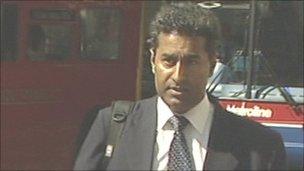Sacked doctor Raj Mattu says he was the 'victim of a witch-hunt'
- Published

Dr Raj Mattu said his sacking had damaged his health and his professional reputation
A sacked heart specialist has told an employment tribunal he fell victim to an NHS "witch-hunt", after going public with concerns about patient safety.
Dr Raj Mattu was sacked by University Hospital of Coventry and Warwickshire NHS Trust in 2010. He was suspended on bullying claims but was later cleared.
In 2001, he exposed the cases of two patients who died in crowded bays at the old Walsgrave Hospital in Coventry.
He is claiming unfair dismissal, which the hospital trust denies.
Dr Mattu is also claiming racial and disability discrimination, which the trust denies.
In a statement submitted to the tribunal in Birmingham, Dr Mattu said his concerns about overcrowding on wards were ignored.
He claimed five patients being allocated to four-bed bays in December 1999, prevented vital equipment being used to save the life of a 35-year-old man.
'Engineered a complaint'
Dr Mattu said he decided to "go public" in September 2001, after a hospital manager appeared in television news reports insisting that lives had not been lost because of overcrowding.
"My disclosures fell on deaf ears and when I made them public, it resulted in a witch-hunt to find increasing numbers of allegations against me," he said.
"[That enabled] the sudden and unfair suspension of me from February 21 2002 to July 27 2007."
An NHS review in 2004 cleared the hospital trust of responsibility for any deaths in relation to overcrowding.
Dr Mattu told the tribunal he believed the Trust had instructed its head of security to spy on him by monitoring his movements while it "engineered" a complaint against him.
He said: "The unlawful actions of the trust damaged my health, my professional reputation and my livelihood and its effects on my personal and private life have been devastating."
Under cross-examination by Jennifer Jones, solicitor for the trust, the doctor was asked why he had "fallen out" with more than 40 colleagues in Coventry.
Dr Mattu said he had worked at nine other hospitals and had "never had a problem with anyone".
"The moment I started raising concerns, my career, for the first time, became a problem," he told the tribunal panel.
The hearing is expected to last until August.
- Published2 August 2011
- Published5 July 2011
- Published3 March 2011
- Published26 May 2010